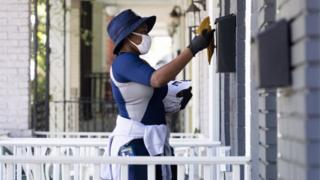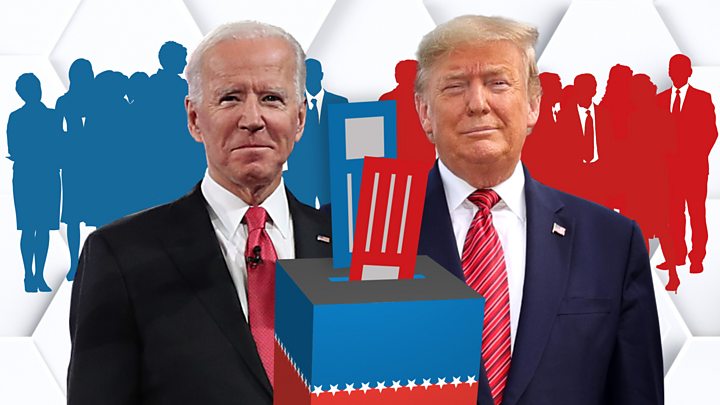 Image copyright EPA
Image copyright EPATwenty years have passed since Americans woke up on an autumn morning after Election Day and did not know who would next lead the country.
It took 36 more days to resolve the contest between Al Gore and George W Bush as the country held its breath.
That prospect could happen again in 2020.
Why?
Well, the pandemic has many people fearful of voting in person because in the US that often means waiting for hours in a queue.
So millions more will vote by post and there are fears it could take days or weeks to count them all, leaving the outcome on a knife-edge.
What usually happens on a normal election night?
Different states stop voting at different times.
The first polls to close are on the East Coast, at about 1900 ET (midnight GMT), and after that you start getting a running total as votes in those states are counted.
Presidents are not picked by winning a national vote. No, instead it’s a series of state-wide races with the winner in each state taking a certain number of what’s called electoral college votes.
A state is “called” for a candidate when a media outlet believes one candidate has an insurmountable lead. It is a projection not a final result.
Similarly, when the whole election is “called” for a candidate, it is not the official result because there are still lots of votes to count.
An election is usually called on the night. And what follows is a choreographed response including a concession speech from the losing candidate. Perhaps not this year – more on that later.

Media playback is unsupported on your device
In 2016 the election was called for Donald Trump at about 0230 EST (0730 GMT) after winning Wisconsin put him over the 270 threshold of electoral college votes.
In the days and weeks that followed, more and more Democratic votes were counted which meant Hillary Clinton stretched her lead in the popular votes but the electoral college was already lost.
An unprecedented volume of postal ballots
Standing in a queue at a polling station on Election Day is the most common way American voters cast ballots, but in recent years, voting by mail has risen in popularity.
Whereas it was previously not uncommon for states to restrict voting by post to special circumstances – such as being a soldier who was serving abroad – now the practice is widely permitted in a majority of states, whether one is an “absentee voter” or for any other reason.
In 2020, the Covid-19 pandemic has prompted an unprecedented number of requests from voters to cast ballots by post.
Some 80 million mail-in ballots are predicted to be cast – double the number in 2016 and more than any other election year.
The concern, then, is whether that volume of ballot deliveries will delay everything.
That fear is not just due to the large volume of ballots to count.
It is also due to the US Postal Service undergoing cutbacks at a time when it has a big responsibility.
First it has to post ballot papers out to people, and then it has to send them back again to election authorities, all before deadlines set by the states.
How are postal votes counted?
States have wide latitude over determining election rules, including setting deadlines for a postal vote to qualify.
Pennsylvania will only include those received by 20:00 local time on Election Day, while California accepts votes as long as they are postmarked by the date, even if they arrive weeks later. That’s why counting in the huge West Coast state always takes a long time.
Postal ballot counting takes longer because each vote must have a signature that is matched with a separate autograph on a registration card.
With double the number of postal ballots expected, that process alone will add time to the count.
Some states like Florida will begin processing the postal votes before Election Day, like verifying signatures, and start actually counting them on the morning of the election.
But most states and Washington DC do not start counting them until all the in-person voting is over and polls have closed.
The National Conference of State Legislatures has a full list of when each state counts postal votes.
What about in-person voting? Will that take longer?
The 2020 primary elections also gave voters a preview of problems that could mar in-person voting on Election Day. States from New York to Alaska struggled with running this traditional and still most common method of casting ballots.
This year, perennial issues like faulty voting machines were compounded by worker shortages and longer than usual queues due to social distancing concerns.
These led to changes that protracted the process.
Kentucky sharply cut the number of polling stations and had to order polls to stay open longer, so people in lower-income areas had to travel much further to cast a vote.
That was hugely controversial, sparking accusations that the pandemic was being used as a way to suppress minority votes.
Alaska forced all voters in some areas to use postal ballots because no polling station could be opened and Georgia was faced with lawsuits over malfunctioning polling machines.
How one key state is preparing for the avalanche of postal votes
By Laura Trevelyan, North Carolina
New Hanover County in Wilmington is the quintessential swing district in a battleground state. And the election is under way here.
Scenic and affluent, it hasn’t voted for a Democratic President since Jimmy Carter. Barack Obama came close in 2008, just losing the county though he won the state – and Donald Trump won narrowly in 2016, carrying the state too.
Because of the coronavirus pandemic, people in North Carolina have been able to request mail-in ballots for months and can do so until 9 October. They began receiving them at the start of September.
The enthusiasm has been off the charts – 813,014 voters had requested mail in ballots by 14 September, out of seven million registered voters in the state.
And here in picture-perfect New Hanover County, where 24.4K have requested mail in ballots, Democrats have the edge, with 12.4K requests, while 7.8K unaffiliated or independent voters are opting to vote by mail, compared to just 3.9K Republicans.
We will catch up come in-person voting, Chase Horton of the New Hanover County Republican Party tells me. Anything Donald Trump is against, like mail in voting, Democrats are for, says Richard Poole, the party chairman in the county.
Kathryn Hedgepeth, of the non-partisan League of Women Voters which represents three counties, is delighted to see so much enthusiasm for voting. She has her absentee ballot already – but she wants to watch the first presidential debate before deciding how to vote.
Candidates have an incentive to delay concession
With passions running so high on both sides, Donald Trump and Joe Biden could be even more determined than usual presidential contenders not to admit defeat.
For Mr Biden, the contours of this year’s voting pattern point to a strategic reason for him to delay conceding if he appears behind in the count on election night.
In the past voting by mail was more popular among older people, and it generally skewed Republican. But in recent years, the trend has shifted toward working people who cannot take time away from work to turn up at the polls, and they skew Democratic.
As a result, there is reason to believe that postal votes counted later will favour Mr Biden. So you could have President Trump ahead on the night but his opponent narrowing the gap in the days that follow.
For months, the president has claimed that illicit forces are threatening to “steal” the election from him – either by methods to under-count his support or over-count ballots for Mr Biden. No small part of his political message has been about rejecting “coastal elites” who do not represent the American heartlands and rural West.
Expect such messages to amplify if he is narrowly ahead on the night of the election, with more drama to follow.
What about poll watchers?
Another factor that may prolong events is the extra scrutiny being paid to voting this year.
The veracity of a ballot can be subject to challenges by volunteer “poll watchers” who look over the shoulders of officials verifying the legitimacy of a ballot.
Ballots that are challenged by a poll watcher are put aside to be checked again before being counted or rejected.
Poll watchers are a legitimate part of the democratic process, but experts warn that campaigns could manipulate their function to delay counts.
The Trump campaign is recruiting “Trump poll watchers”, whom critics fear will contest ballots to get them thrown out and delay the count.
Will there be legal challenges too?
All this change and confusion mean that legal disputes are all but inevitable.
More than 190 election lawsuits have already been filed in 2020, contesting everything from identification requirements for postal voting to the legality of Covid-related changes to primary voting dates.
It is anyone’s guess what legal challenges could emerge that delay voting beforehand or reporting a definitive result afterwards.
But 2020 is shaping up to be the most litigious election in US history, according to Richard Hasen, a legal scholar at the University of California Irvine.
In the 2000 election, Mr Gore initially conceded and then retracted his concession after believing that his margin of loss in Florida should trigger a recount.
It took a Supreme Court decision over the legality of a recount to settle the contest.
Click Here to Visit Orignal Source of Article https://www.bbc.co.uk/news/election-us-2020-54096399


